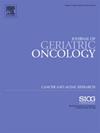Digital intrinsic capacity assessment of older patients with hematological malignancies: The ONCO-ICOPE cohort
IF 3
3区 医学
Q3 GERIATRICS & GERONTOLOGY
引用次数: 0
Abstract
Introduction
Comprehensive geriatric assessment (CGA) can prevent functional decline in patients with hematological malignancies (HM). The Integrated Care for Older People (ICOPE) program has been developed to monitor intrinsic capacity (IC) and to propose patient-centred interventions to prevent functional decline. ICOPE may also be relevant in older adults with HM. The objective of this study was to describe IC in older patients with HM.
Materials and Methods
Patients aged above 60 years old diagnosed with a HM, with an activities of daily living (ADL) score ≥ 5, were recruited from the Oncological Geriatric department of the Toulouse University Hospital during routine cancer assessment. The ICOPE Step 1 was implemented in all participants using a digital tool. IC was assessed in these domains: cognition, mobility, nutrition, mood, vision, and hearing. A follow-up Step 1 was proposed systematically at six months.
Results
A total of 403 patients with HM aged 82 (±6.5) years underwent a Step 1 assessment. Three hundred and seventy-one (92.1 %) patients presented an altered Step 1 assessment with 2.4 ± 1.4 altered IC domains. The most frequent altered domains were cognition in 203 (50.4 %), hearing in 193 (47.9 %), and mobility in 177 (43.9 %). Two hundred twelve (65.8 %) underwent a Step 1 follow-up at six months.
Discussion
ONCO-ICOPE provides an innovative framework to assess and monitor IC in patients with HM at high risk of functional decline. With a digital solution, its objective is to expand IC assessment and bridge the gap between primary care and oncologic care for a more personalized patient care plan.
老年血液恶性肿瘤患者的数字内在能力评估:ONCO-ICOPE 队列
综合老年评估(CGA)可以预防血液系统恶性肿瘤(HM)患者的功能下降。制定了老年人综合护理(ICOPE)计划,以监测内在能力(IC)并提出以患者为中心的干预措施,以防止功能衰退。ICOPE也可能与老年HM患者有关。本研究的目的是描述老年HM患者的IC。材料与方法从图卢兹大学医院老年肿瘤科招募年龄在60岁以上、日常生活活动(ADL)评分≥5分的HM患者,进行常规癌症评估。ICOPE第1步在所有参与者中使用数字工具实施。IC在以下领域进行评估:认知、活动、营养、情绪、视觉和听力。在6个月时系统地提出了后续步骤1。结果共有403例82(±6.5)岁HM患者进行了第一步评估。371例(92.1%)患者出现Step 1评估改变,IC域改变2.4±1.4个。最常见的改变领域是认知203例(50.4%),听力193例(47.9%),活动能力177例(43.9%)。212例(65.8%)在6个月时接受了第一步随访。onco - icope提供了一个创新的框架来评估和监测功能衰退高风险HM患者的IC。通过数字解决方案,其目标是扩大IC评估,弥合初级保健和肿瘤护理之间的差距,以实现更个性化的患者护理计划。
本文章由计算机程序翻译,如有差异,请以英文原文为准。
求助全文
约1分钟内获得全文
求助全文
来源期刊

Journal of geriatric oncology
ONCOLOGY-GERIATRICS & GERONTOLOGY
CiteScore
5.30
自引率
10.00%
发文量
379
审稿时长
80 days
期刊介绍:
The Journal of Geriatric Oncology is an international, multidisciplinary journal which is focused on advancing research in the treatment and survivorship issues of older adults with cancer, as well as literature relevant to education and policy development in geriatric oncology.
The journal welcomes the submission of manuscripts in the following categories:
• Original research articles
• Review articles
• Clinical trials
• Education and training articles
• Short communications
• Perspectives
• Meeting reports
• Letters to the Editor.
 求助内容:
求助内容: 应助结果提醒方式:
应助结果提醒方式:


